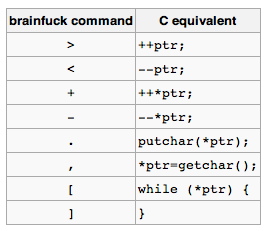Ecosyste.ms: Awesome
An open API service indexing awesome lists of open source software.
https://github.com/ujihisa/bfc
Brainf**c Compilers (BF to Ruby, C, Haskell, Scheme and LLVM)
https://github.com/ujihisa/bfc
Last synced: about 1 month ago
JSON representation
Brainf**c Compilers (BF to Ruby, C, Haskell, Scheme and LLVM)
- Host: GitHub
- URL: https://github.com/ujihisa/bfc
- Owner: ujihisa
- Created: 2009-12-23T22:28:51.000Z (almost 15 years ago)
- Default Branch: master
- Last Pushed: 2012-04-15T08:02:12.000Z (over 12 years ago)
- Last Synced: 2024-05-01T23:19:15.596Z (7 months ago)
- Language: Ruby
- Homepage:
- Size: 105 KB
- Stars: 10
- Watchers: 3
- Forks: 0
- Open Issues: 0
-
Metadata Files:
- Readme: README.md
Awesome Lists containing this project
README
# BFC: Brainf**k Compilers
`bfc.rb` is a compiler written in Ruby, which can compile BF code to Ruby, C, Haskell and LLVM.
## USAGE
$ ./bfc.rb --help
$ ./bfc.rb [-v|--version]
$ ./bfc.rb [-r|--ruby] helloworld.bf > helloworld.rb
$ ./bfc.rb [-c|--c] helloworld.bf > helloworld.c
$ ./bfc.rb [-h|--haskell] helloworld.bf > helloworld.hs
$ ./bfc.rb [-l|--llvm] helloworld.bf > helloworld.ll
$ ./bfc.rb [-s|--scheme] helloworld.bf > helloworld.scm
$ cat helloworld.bf | ./bfc.rb --ruby
$ ./bfc.rb [-r|--ruby|-c|--c|-h|--haskell|-l|--llvm] helloworld.bf --run
$ ./bfc.rb [-c|--c] helloworld.bf --without-while > helloworld.c
$ spec ./bfc.rb
## AUTHOR
Tatsuhiro Ujihisa
## LICENCE
MIT
## ACKNOWLEDGEMENT
Without Nanki's bugfixes and advice, this project would have never finished.
# ANATOMY OF BFC
## THE BRAINF**K LANGUAGE
According to Wikipedia, the programming language Brainf\*\*k has the following 8 tokens that each have semantics. Here is the equivalent transformation from Brainf\*\*k to C.

The `bfc.rb` converts BF codes to each languages mostly based on the table.
C Translation Table in `bfc.rb`:
',' => '*h=getchar();',
'.' => 'putchar(*h);',
'-' => '--*h;',
'+' => '++*h;',
'<' => '--h;',
'>' => '++h;',
'[' => 'while(*h){',
']' => '}'
Ruby Translation Table in `bfc.rb`:
',' => 'a[i]=STDIN.getc.ord',
'.' => 'STDOUT.putc(a[i])',
'-' => 'a[i]-=1',
'+' => 'a[i]+=1',
'<' => 'i-=1',
'>' => 'i+=1',
'[' => 'while a[i]!=0',
']' => 'end'
They are straightforward enough not to be explained the detail.
In the same way, we can write translation tables for most programming languages except special languages including Haskell and Assembly languages.
## TRANSLATING TO HASKELL
Translating BF to Haskell needs two tricks. Haskell was difficult to handle BF because:
* Variables in Haskell are not allowed to be re-assigned
* `++h` is impossible
* There's no feature like `while` statement
So I used IO Monad with biding same-name variables, and defined `while` function.
Haskell Translation Table in `bfc.rb`:
',' => 'tmp <- getChar; h <- return $ update (\_ -> ord tmp) i h;',
'.' => 'putChar $ chr $ h !! i;',
'-' => 'h <- return $ update (subtract 1) i h;',
'+' => 'h <- return $ update (+ 1) i h;',
'<' => 'i <- return $ i - 1;',
'>' => 'i <- return $ i + 1;',
'[' => '(h, i) <- while (\(h, i) -> (h !! i) /= 0) (\(h, i) -> do {',
']' => 'return (h, i);}) (h, i);'
And the definition of `while` is:
while cond action x
| cond x = action x >>= while cond action
| otherwise = return x
This is short, but can handle loop with changing the value with larger scope like C's.
## TRANSLATING TO C WITHOUT WHILE STATEMENTS
Unlike the effort on Haskell, it is impossible to write simple translation table for C when I can use only `goto` for control flows instead of `while` statements. So I made the compile to have label counters to make labels for `goto` a lot.
Excerpt from `bfc.c`:
when ','; '*h=getchar();'
when '.'; 'putchar(*h);'
when '-'; '--*h;'
when '+'; '++*h;'
when '<'; '--h;'
when '>'; '++h;'
when '['; "do#{counter += 1}:"
when ']'
"if (*h != 0) goto do#{counter}; else goto end#{counter};" <<
"end#{counter}:"
end
## TRANSLATING TO LLVM
[LLVM Assembly language](http://ujihisa.blogspot.com/2009/12/llvm-for-starters.html) is similar to Haskell to the extent of the prohibition of re-assignments, and not similar to Haskell to the extend of having `do` syntax for Monad. So I decided to use pointers to store values. Also, LLVM needs many temporary variables which cannot be re-assigned, so I used counters again to use temporary constants.
The translation table with counters is too big to paste here, so I'll just show the definition of `'+'` which means `'++h'` in C.
when '+'
a = tc += 1; b = tc += 1; c = tc += 1; d = tc += 1
"%tmp#{a} = load i32* %i, align 4\n" <<
"%tmp#{b} = getelementptr [1024 x i8]* %h, i32 0, i32 %tmp#{a}\n" <<
"%tmp#{c} = load i8* %tmp#{b}, align 1\n" <<
"%tmp#{d} = add i8 1, %tmp#{c}\n" <<
"store i8 %tmp#{d}, i8* %tmp#{b}, align 1\n"
(where `tc` is the abbreviation of `tmp counter`.)
One more thing. LLVM is famous for its aggressive optimizations. For example, the result of the conversion from `helloworld.bf` to LLVM Assembly Language is very long.
$ ./bfc.rb --llvm ./helloworld.bf | wc -l
2842
But once you optimize the assembly by `opt` command of LLVM, the line of code will become shorter and more succinct.